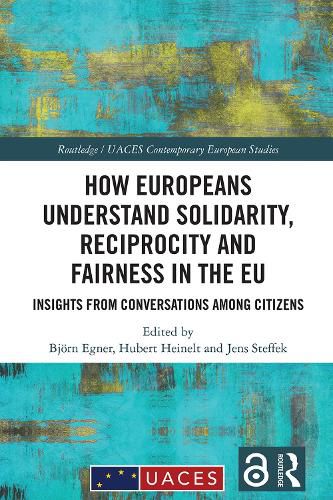Readings Newsletter
Become a Readings Member to make your shopping experience even easier.
Sign in or sign up for free!
You’re not far away from qualifying for FREE standard shipping within Australia
You’ve qualified for FREE standard shipping within Australia
The cart is loading…






This edited book sheds new light on the understanding of solidarity, reciprocity and fairness from the perspective of European Union (EU) citizens and, with this, how cohesion in the EU can be achieved.
Drawing on extensive focus group research across nine countries, the book presents the results of this large project to assess what citizens think they owe their fellow Europeans in other parts of the EU. It brings together participants from different social milieus - highly qualified professionals, low-paid and unemployed persons and young adults - and reveals much about how average citizens think and talk about the issues and crises facing the EU, such as the reasons behind their beliefs and the statements they develop when discussing such issues, and therefore, provides a deeper insight into how exactly EU citizens understand solidarity, reciprocity and fairness when it comes to transborder relations and their attitudes towards EU cohesion.
This book will be of key interest to scholars and students in European studies/politics, and more broadly to comparative politics, international relations, civil society organisations and the wider social sciences.
The Open Access version of this book, available at www.taylorfrancis.com, has been made available under a Creative Commons Attribution-Non Commercial-No Derivatives (CC-BY-NC-ND) 4.0 license.
$9.00 standard shipping within Australia
FREE standard shipping within Australia for orders over $100.00
Express & International shipping calculated at checkout
This edited book sheds new light on the understanding of solidarity, reciprocity and fairness from the perspective of European Union (EU) citizens and, with this, how cohesion in the EU can be achieved.
Drawing on extensive focus group research across nine countries, the book presents the results of this large project to assess what citizens think they owe their fellow Europeans in other parts of the EU. It brings together participants from different social milieus - highly qualified professionals, low-paid and unemployed persons and young adults - and reveals much about how average citizens think and talk about the issues and crises facing the EU, such as the reasons behind their beliefs and the statements they develop when discussing such issues, and therefore, provides a deeper insight into how exactly EU citizens understand solidarity, reciprocity and fairness when it comes to transborder relations and their attitudes towards EU cohesion.
This book will be of key interest to scholars and students in European studies/politics, and more broadly to comparative politics, international relations, civil society organisations and the wider social sciences.
The Open Access version of this book, available at www.taylorfrancis.com, has been made available under a Creative Commons Attribution-Non Commercial-No Derivatives (CC-BY-NC-ND) 4.0 license.